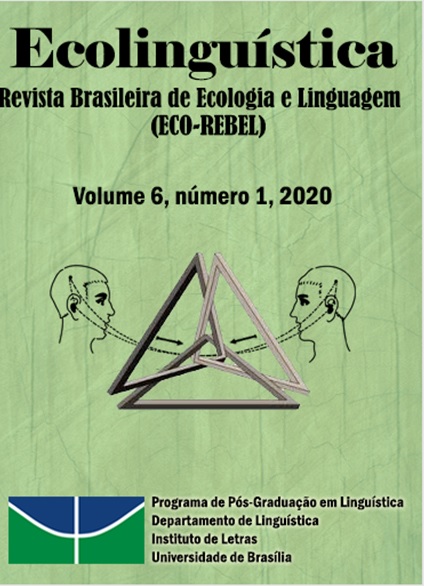Quo vadis ecolinguistics
Resumo
O gênero deste ensaio é aalpiri (palavra das línguas do Deserto Ocidental da Austrália para ‘rosnado matutino’); ele expressa os motivos porque tenho estado longe de ser feliz com a direção que a ecolinguística tomou nos últimos anos. Na minha opinião, a ecolinguística não atende as expectativas de seus fundadores e toda a empreitada está longe de ser a soma de suas partes. Muita ecolinguística é movida por ideologia em vez de sê-lo por uma sólida pesquisa acadêmica, de modo que sua eficácia deixa muito a desejar. O título sugere que os ecolinguistas precisam refletir sobre para onde estão indo.
Downloads
Referências
Idström, A. & Piirainen, E. (Eds.). (2012). Endangered metaphors. Amsterdam: Benjamins.
Jung, M. (1996). Ökologische Sprachkritik. In: A. Fill (Ed.), Sprachökologie und Ökolinguistik (pp. 149-173). Tübingen: Stauffenburg.
Ketteman, B. & Penz, H. (Eds.). (2000). ECOnstructing Language, Nature and Society. The Ecolinguistic Project Revisited. Essays in Honour of Alwin Fill. Tübingen: Stauffenburg.
Korzybski, A. (1933). Science and Sanity. Lancaster P.A.: The Science Press Printing Company.
Lorenz, K. (1973). Die Rückseite des Spiegels - Versuch einer Naturgeschichte menschlichen Erkennens. München: Piper
Lorenz, K. (1982). Die acht Todsiinden der zivilisierten Menschheit. Miinchen: Piper.
Lovelock, J. (1988) The Ages of Gaia. Oxford: Oxford University Press.
Marko, G. (2000). Go Veggie! A Critical Discourse Analysis ofa Text for Vegetarian Beginners. In B. Ketteman & H. Penz (Eds.), ECOnstructing Language, Nature and Society. The Ecolinguistic Project Revisited. Essays in Honour of Alwin Fill (pp. 217-240). Tübingen: Stauffenburg.
Mühlhäusler, P. (1983). Talking About Environmental Issues. Language and Communication, 3(1), 71-81.
Mühlhäusler, P. (1995). Metaphors others live by. Language and Communication, 15 (3), 281-288.
Mühlhäusler, P. (1996). Linguistic adaptation to changed environmental conditions: Some lessons from the past. In A. Fill (Ed.) Sprachökologie und Ökolinguistik (pp. 105-130). Tiibingen: Stauffenburg.
Mühlhäusler, P. (1997). Language Ecology: Contact Without Conflict. In: Martin Pütz (Ed.) Language Choices: Conditions, Constraints, and Consequences (pp. 3-15). Amsterdam: Benjamins.
Mühlhäusler, P. (2000). Bleached Language on Unbleached Paper: The Language of Ecotourism. In B. Ketteman & H. Penz (Eds.), ECOnstructing Language, Nature and Society. The Ecolinguistic Project Revisited. Essays in Honour of Alwin Fill (pp. 241-253). Tubingen: Stauffenburg Verlag.
Mühlhäusler, P. (2003). Language of Environment: Environment of Language. London: Battlebridge Publications.
Mühlhäusler, P. (2006). Naming languages, drawing language boundaries and maintaining languages, with special reference to the linguistic situation in Papua New Guinea. In: D. Cunningham, D. E. Ingram & K. Sumbuk (Eds.), Language diversity in the Pacific: Endangerment and survival (pp. 24-39). Clevedon: Multilingual Matters.
Mühlhäusler, P. & Peace, A. (2006). Environmental Discourses. Annual Review of Anthropology, 35, 457-479
Mühlhäusler, P. & Damania, R. (2004). Economic costs and benefits of Australian Indigenous languages: Discussion Paper. Canberra: Department of Communication, Information Technology and the Arts (DCITA).
Myerson, G. & Rydin, Y. (1996). The Language of Environment: A new rhetoric. UCL Press: London.
Reddy, M. J. (1979). The conduit metaphor: A case of frame conflict in our language about language. In A. Ortony (Ed.), Metaphor and Thought (pp. 284-310). Cambridge: Cambridge University Press.
Toffler, A. (1970). Future Shock. New York: Random House.
Wohlleben, P. (2016). The hidden life of trees. London: William Collin
Downloads
Publicado
Como Citar
Edição
Seção
Licença
Autores que publicam nesta revista concordam com os seguintes termos:
Autores mantêm os direitos autorais e concedem à revista o direito de primeira publicação, sendo o trabalho simultaneamente licenciado sob a Creative Commons Attribution License o que permite o compartilhamento do trabalho com reconhecimento da autoria do trabalho e publicação inicial nesta revista.
Autores têm autorização para assumir contratos adicionais separadamente, para distribuição não exclusiva da versão do trabalho publicada nesta revista (ex.: publicar em repositório institucional ou como capítulo de livro), com reconhecimento de autoria e publicação inicial nesta revista.
Autores têm permissão e são estimulados a publicar e distribuir seu trabalho online (ex.: em repositórios institucionais ou na sua página pessoal) a qualquer ponto antes ou durante o processo editorial, já que isso pode gerar alterações produtivas, bem como aumentar o impacto e a citação do trabalho publicado (Veja O Efeito do Acesso Livre).



3.png)



